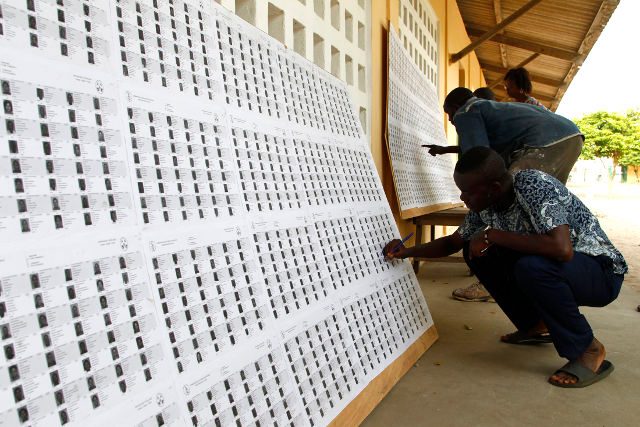SUMMARY
This is AI generated summarization, which may have errors. For context, always refer to the full article.

LOME, Togo – Togo began voting for a new president on Saturday, April 25, with the incumbent Faure Gnassingbe seeking a third term in office to extend his family’s grip on power into a second half-century.
Polling stations in Lome, the capital of tiny West African nation opened shortly after 0700 GMT, with some 9,000 police and soldiers on patrol, and with borders shut until Sunday morning for security reasons.
Gnassingbe, 48, has been in power since the death of his father, Gnassingbe Eyadema, in 2005, winning contested elections that year and five years later.
Fears of election-linked violence are still fresh in the memory in Togo after some 500 people were killed and thousands more injured in the disputed 2005 vote, according to the UN.
The government announced the closure of land borders from 2100 GMT on Friday until 0600 GMT on Sunday “to ensure optimal security conditions” for the elections.
Armoured military vehicles were seen in the streets of Lome on Friday.
Queues were thin in the central administrative district, but in the densely populated Pa de Souza neighbourhood – an opposition stronghold – hundreds were waiting to cast their ballots, Agence France-Presse journalists said.
Some 3.5 million of Togo’s seven million people are registered to vote. They will choose between Gnassingbe and his beaten opponent from last time round, opposition leader Jean-Pierre Fabre.
On the campaign trail, Gnassingbe vaunted his introduction of free primary schools and infrastructure projects such as new roads.
But Fabre, who heads a five-party coalition called Combat for Political Change (CAP 2015), has called for regime change after 48 years of unbroken rule by the president and his father before him.
Close monitoring
Few people in the former French colony have felt the benefit of recent economic growth and according to the government, unemployment is rife at 29%
Years of sanctions imposed by international blocs such as the European Union during Gnassingbe Eyadema’s autocratic regime have hit business and education, the administration maintains.
Faure Gnassingbe is considered the clear favorite going into the vote given the power of incumbency and the backing of the military, most of whom come from his home region in the north.
But Fabre is hoping for a repeat of the recent opposition victory of Muhammadu Buhari in Nigeria and the departure of neighbouring Burkina Faso’s Blaise Compaore last year after a popular uprising.
Gnassingbe won 60.88 percent of the vote against Fabre’s 33.93 percent in 2010. Some analysts believe the result could be closer if the opposition leader is able to mobilise stay-at-home voters.
Complaints about irregularities in the electoral register, including ghost voters, forced a 10-day postponement to the election.
More than 1,200 election observers, including from the West African bloc ECOWAS, the African Union and Togolese civil society, will be on hand to monitor voting.
The current ECOWAS chairman, Ghana’s President John Dramani Mahama, said this week that “the entire international community is watching” and called on candidates to accept the result.
Five candidates in all are contesting the election, which is held in one round.
One smaller opposition party has called for a boycott of the vote on the grounds that long-called-for constitutional reforms have not been obtained.
Currently there are no limits to the presidential mandate. The opposition has called for a two-term limit. – Marc Bastian and Emile Kouton, AFP/Rappler.com
Add a comment
How does this make you feel?
There are no comments yet. Add your comment to start the conversation.